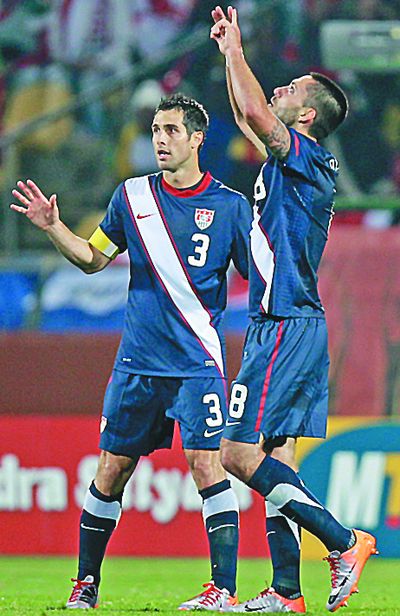USA’s World Cup fate in its hands
Victory over Algeria will send team to elimination round

PRETORIA, South Africa – One more game, one last chance to make their reputation.
When the Americans play Algeria at the World Cup this morning they’ll either live up to all the hype and earn a spot among the final 16 teams – or fall painfully short of their long-stated goal and lose a watershed opportunity.
“We have a great chance tomorrow night to get a win and advance on to the second round,” captain Carlos Bocanegra said Tuesday. “It’s important for us because we had that disappointment in ’06. It’s not really extra motivation, but it’s just in the back of our minds. You work so hard and you train for so long for the World Cup, and it can be over so quickly if you don’t advance.”
A victory or possibly a tie would move the United States into the knockout rounds on a high that will set off midday celebrations back home. Replicate the loss to Ghana that knocked the U.S. out in 2006, and it will start a new round of soul-searching and could cost coach Bob Bradley his job – not to mention dampening the burgeoning enthusiasm for soccer in America.
Since returning to the World Cup in 1990 following a 40-year absence, the U.S. has alternated first-round elimination (’90, ’98 and ’06) with a second-round appearance at home in 1994 and a trip to the quarterfinals in South Korea in 2002.
This World Cup started with a come-from-behind 1-1 tie against glamorous England. Then the Americans trailed Slovenia by two goals at halftime only to fight back as Landon Donovan and Michael Bradley scored for a 2-2 draw. They appeared to go ahead, but Maurice Edu’s 85th-minute goal was disallowed for reasons referee Koman Coulibaly of Mali didn’t explain.
“We’re not going to worry about any calls or anything like that getting us down,” Bocanegra said. “We had a good second half and hopefully we can continue with that momentum and put that into the Algeria game.”
The U.S. has never before faced the Desert Foxes, who have yet to score in this tournament following a 1-0 loss to Slovenia and a 0-0 draw against England. Algeria can advance only with a win, and Les Fennecs coach Rabah Saadane repeatedly used the phrase “God willing” in reference to a victory.
“We are in a good mood to make our people back home very happy,” Algeria captain Antar Yahia said.
A win would send the U.S. to a second-round matchup this weekend with Germany, Ghana, Serbia or Australia, and another big television audience for American soccer. With France knocked out, and England, Germany, defending champion Italy and Spain all uncertain of reaching the knockout stage, the U.S. could find itself in a fairly wide-open tournament if it advances.
Coaches will be paying attention to the England-Slovenia game, which will be played simultaneously in Port Elizabeth. If the English lose, the U.S. would advance with a tie. If both the U.S. and England draw, the Americans reach the second round if they maintain their goal advantage over the English, currently 3-1.
It could get thorny if the U.S. and the English tie, and England scores two goals more than the Americans. Then Slovenia would win the group and a televised drawing of a ball from a bowl would be held in Johannesburg at 10 a.m. PDT to determine whether the U.S. or England finishes second.
“I think for us the concentration is just on getting ready for the match,” Bob Bradley said. “So many things can happen along the way, so we’ve not put much thought into the final way of determining things.”
Michael Kammarman, the U.S. team’s press officer, will be responsible for keeping staff aware of the score in the England-Slovenia game. What happens in the other match could determine how much the U.S. pushes for a late goal.
“You have to be a little careful because you want to just play and you don’t want to, at the end of the game, think that if we hold onto this result that we’re going to get through and then you get a goal scored on you and you’re out of it,” Donovan said. “So you have to play, but also be aware of what the other result is.”